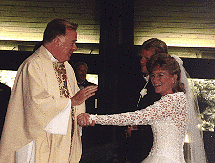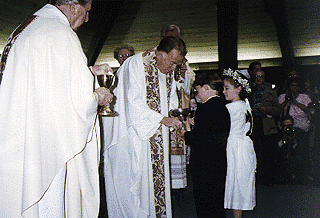
Introduction to January's Issue:
Thoughts on the Priesthood
If you look back and analyze the history of the priesthood,
you will find a remarkable record of men who worked for God,
their Church, their community. Before I get into this article on
the priesthood, let me say that I know their frailties, their
faults, their sins, their weaknesses. But to this I add
"which of us can throw the first stone"?
Shortly after the institution of the priesthood, Jesus Christ,
while knowing the weaknesses of the priests he ordained, sent
them to the ends of the earth. Now these were the same men who
deserted him in the agony in the Garden and one denied, one
betrayed and one doubted him. But with the exception of Judas,
they left the upper room in Jerusalem and lived and preached his
Gospel. Think of this, from that upper room in Jerusalem every
country in the world, some 700 million people, have heard the
story of how Jesus Christ took in his hands lifeless bread and
changed it into the Bread of Life in the Eucharist. And the
priesthood played the greatest role in this achievement.
 The priesthood over the centuries has
meant many things to many people. Every priest knows his strength
and weaknesses. Every priest from the moment of ordination hopes
that God will help him use his strengths and talents and give him
the strength to lessen his weaknesses. He is as human as the
reader of this article. He is aware of what God wants him to do.
And most, thank God, try to walk worthily in the vocation to
which God has called them.
The priesthood over the centuries has
meant many things to many people. Every priest knows his strength
and weaknesses. Every priest from the moment of ordination hopes
that God will help him use his strengths and talents and give him
the strength to lessen his weaknesses. He is as human as the
reader of this article. He is aware of what God wants him to do.
And most, thank God, try to walk worthily in the vocation to
which God has called them.
History has always reminded us of the great priest and
Bishop, St. Augustine. How his intellectual works, his Confessions,
his City of God and other writings had such a powerful
impact on the culture of his society. And priests could tell you
of the great works by St. Thomas, an ordinary priest and the
theological insights he gave in his sermons.
If you go throughout history you will read about the great
Jesuit priests, teachers, astronomers and other professors who
preached the Gospel according to their background and insights.
 Every priest, even if he is never
mentioned by posterity, has by his priesthood made his community
and the world a better place in which to live. That priest in
your own parish, whose name you have forgotten, who brought
Communion on First Friday to a sick mother or father; that priest
who tried in CYO to help your child to grow and mature; that
priest who visited you in the hospital or fed the needy in your
own parish; these are the priests from our past that have
enriched our lives. They are the ones who baptized you, gave
communion to your children, performed marriages, helped the sick
in your family and offered consolation at the death of a member
of your family. These are the men who over the centuries had a
vocation to fulfill and a job to do. Simply speaking, that job
was to bring Christ to others.
Every priest, even if he is never
mentioned by posterity, has by his priesthood made his community
and the world a better place in which to live. That priest in
your own parish, whose name you have forgotten, who brought
Communion on First Friday to a sick mother or father; that priest
who tried in CYO to help your child to grow and mature; that
priest who visited you in the hospital or fed the needy in your
own parish; these are the priests from our past that have
enriched our lives. They are the ones who baptized you, gave
communion to your children, performed marriages, helped the sick
in your family and offered consolation at the death of a member
of your family. These are the men who over the centuries had a
vocation to fulfill and a job to do. Simply speaking, that job
was to bring Christ to others.
And so this edition of Spirituality for Today
is to remember those priests who gave so much; to recall these
priests who reminded you of Christ; to pray for those priests who
made the Church and the community a better place in which to live
simply because they did what God wanted them to do. They changed
lifeless bread into the Bread of Life. And all of us owe this
bread to those priests of the past and present who made us aware
of these words of Christ: "Do this in commemoration of
me."
Souvenir of a Priest
Among the papers of Father Henry Fritz, S.M., who died in
December, 1968, was found the following: Here are the Rules I
live by - and may I add that it is best to start before 50.
- BE THANKFUL for what you have. Don't complain because
things aren't better. They could be worse.
- BE HELPFUL, but never intrude on others.
- SUGGEST - don't boss.
- DON'T BE A CRITIC, but take criticism without resentment.
- NEVER SAY AN UNKIND thing - even if it is true.
- CULTIVATE a sense of humor and use it when things go
wrong.

 The priesthood over the centuries has
meant many things to many people. Every priest knows his strength
and weaknesses. Every priest from the moment of ordination hopes
that God will help him use his strengths and talents and give him
the strength to lessen his weaknesses. He is as human as the
reader of this article. He is aware of what God wants him to do.
And most, thank God, try to walk worthily in the vocation to
which God has called them.
The priesthood over the centuries has
meant many things to many people. Every priest knows his strength
and weaknesses. Every priest from the moment of ordination hopes
that God will help him use his strengths and talents and give him
the strength to lessen his weaknesses. He is as human as the
reader of this article. He is aware of what God wants him to do.
And most, thank God, try to walk worthily in the vocation to
which God has called them.
 Every priest, even if he is never
mentioned by posterity, has by his priesthood made his community
and the world a better place in which to live. That priest in
your own parish, whose name you have forgotten, who brought
Communion on First Friday to a sick mother or father; that priest
who tried in CYO to help your child to grow and mature; that
priest who visited you in the hospital or fed the needy in your
own parish; these are the priests from our past that have
enriched our lives. They are the ones who baptized you, gave
communion to your children, performed marriages, helped the sick
in your family and offered consolation at the death of a member
of your family. These are the men who over the centuries had a
vocation to fulfill and a job to do. Simply speaking, that job
was to bring Christ to others.
Every priest, even if he is never
mentioned by posterity, has by his priesthood made his community
and the world a better place in which to live. That priest in
your own parish, whose name you have forgotten, who brought
Communion on First Friday to a sick mother or father; that priest
who tried in CYO to help your child to grow and mature; that
priest who visited you in the hospital or fed the needy in your
own parish; these are the priests from our past that have
enriched our lives. They are the ones who baptized you, gave
communion to your children, performed marriages, helped the sick
in your family and offered consolation at the death of a member
of your family. These are the men who over the centuries had a
vocation to fulfill and a job to do. Simply speaking, that job
was to bring Christ to others.